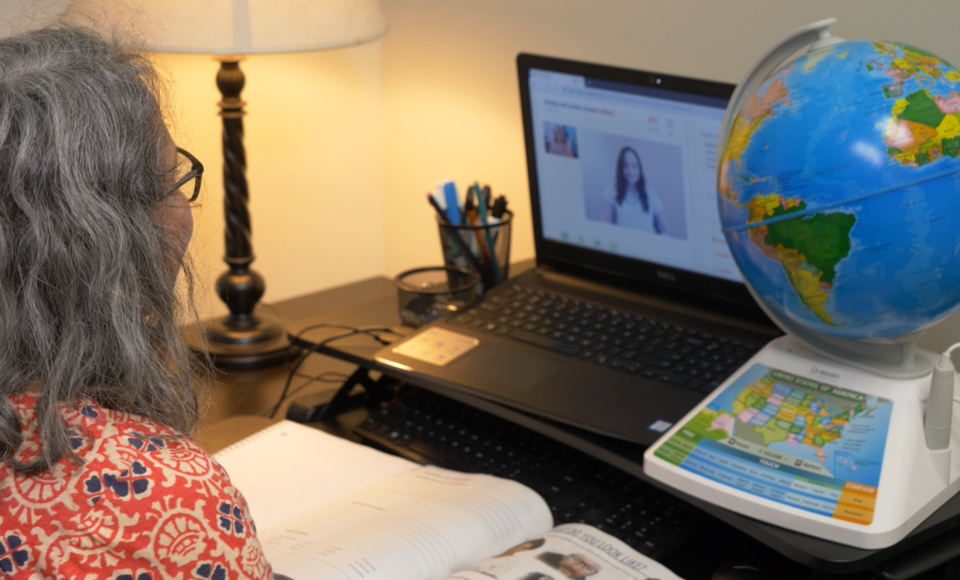After pivoting to virtual lessons during the COVID-19 pandemic, language-teaching nonprofit Intercambio is using technology to expand its mission and open up access to more eager learners and volunteers.
Intercambio’s CC English platform officially launched in July, according to Program Manager Johnny Dejeas, connecting students and teachers across cultures, time zones and even national borders.
Intercambio brings volunteer teachers and English-language learners together to foster connections and build confidence in language skills through one-on-one classes. Over the past 20 years, Intercambio has trained more than 5,000 volunteer teachers and offered classes to more than 10,000 adult English learners, according to Interim Executive Director Jenny Desmond.
Like many organizations, Intercambio’s language classes came to a halt when COVID-19 put Colorado in lockdown. In May 2020, the nonprofit started offering classes online in a limited capacity and the Intercambio team saw how the communities they served were already adapting to using video software like Zoom and Skype to connect with schools, doctors and church services. At the same time, Intercambio’s national partners saw an imbalance — some areas had too many teachers and not enough students or vice versa.
Those three factors — video technology, online classes and a desire to address the imbalance — led Intercambio to develop a pilot program in Summer 2020 that would become CC English, he said. With the help of Intercambio board chair Juan Pelaez and his company 3 Metas, Intercambio developed a platform that would fully integrate video chat, messaging tools, assignment tracking and other online resources to utilize Intercambio’s existing curriculum.
The key to the curriculum comes from removing the power dynamics between teacher and student, Desmond said. While students sign up with Intercambio and CC English to improve their verbal and written English language skills, the curriculum promotes cultural exchange between teacher and student.
“The power balance has typically been that the teacher knows everything, the student knows nothing,” Desmond explained. “But if you’re an adult immigrant who’s been alive for however many years, you have all these experiences your teacher has never had.”
The idea of culture exchange and education through conversation is the throughline for Intercambio and CC English. With a curriculum already in place and being packaged to share around the country, Dejeas said there are still a few hurdles the program needed to clear.
Scheduling has been one of the biggest challenges, Dejeas said, particularly across time zones and work schedules. Local scheduling was done by hand, he explained, with a meticulous set of calendars plotted out over the course of hours. Introducing different time zones and countries presented a new challenge for CC English. Dejeas and his colleagues are exploring algorithms and scheduling software that will streamline the matchmaking process between students and teachers, he said.
The other major hurdle was access to technology. Intercambio and CC English serve students with a variety of backgrounds, including immigrants and refugees, many of whom lack access to technology like computers and tablets. The program sometimes requires students to access a workbook while on a video call with the teacher, Dejeas said.
Most students only have a smartphone to rely on, Dejeas said, and the solution turned out to be simple — mail the students physical books when needed. Teachers have access to the digital or physical books as needed and the conversation still happens face-to-face, he explained.
“It was tough and it’s still hard for some students, holding their phone and looking at the book,” Dejeas said. “It would be much better to have a laptop.”
Students and teachers meet twice a week for at least 90 minutes, Desmond said. Once the volunteers from Intercambio adapted to the technological platform of CC English, the program continued to grow, she added.
One volunteer, Kim Elliott, volunteered with Intercambio a few months before she discovered CC English. Elliott said one of her biggest surprises was how easy the process was — the platform included all materials, lesson plans and slides she needed, so it was easy to focus on one-on-one time with her student.
“After my student and I got comfortable with the mechanics of the platform and using Zoom, our focus shifted to the content of the lesson and our conversations,” Elliott said. “It often feels like we are sitting in the same room, sharing ideas with a friend.”
Six months after the official launch, Dejeas said CC English is going strong. The next step is expanding the reach of the program both locally and through Intercambio’s national partners. Dejeas hasn’t done any active marketing for the program, but volunteers and students continue to sign up.
“Looking forward, as soon as we’re able to scale up the program for matching people and then we’ll start actively marketing,” Dejeas said.
According to Desmond, there are 19 million immigrants in the U.S. who report speaking English less than well. The hope is that CC English can expand in the coming years to be a resource for all of them, she said.



